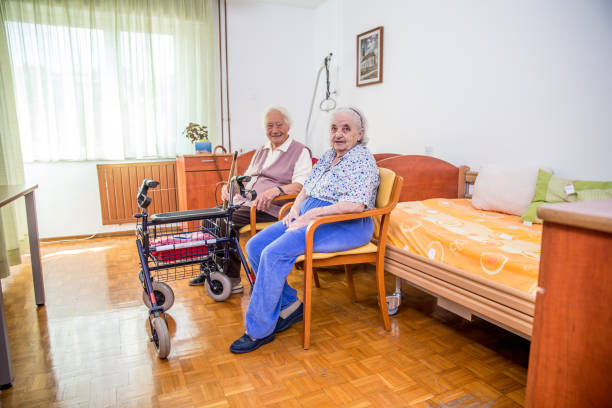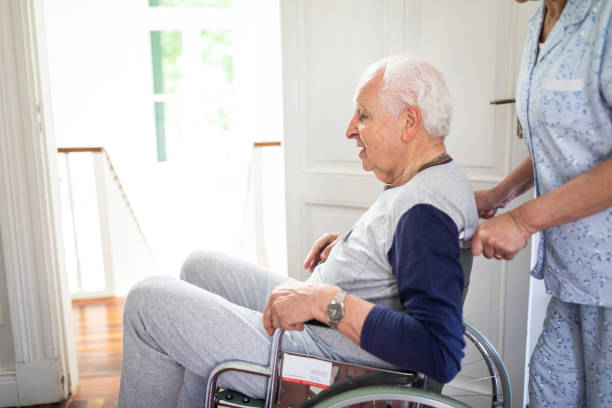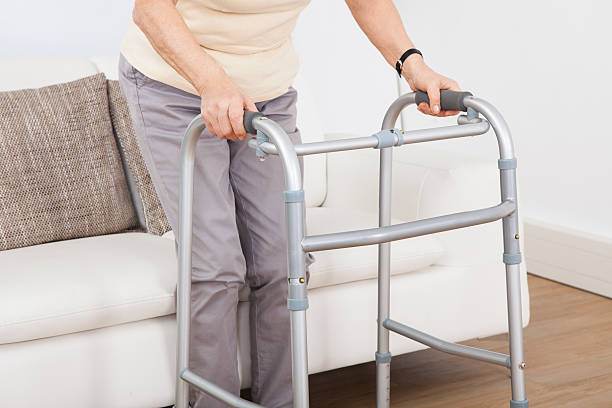Introduction

Living with Parkinson's disease can present unique challenges, affecting daily life, including mobility, coordination, and balance. However, there is a growing recognition of the importance of adaptive furniture in enhancing the comfort, safety, and independence of individuals with Parkinson's disease. These specialized furniture pieces are thoughtfully designed to cater to the specific needs and limitations of the condition.
In this blog post, we will explore the remarkable benefits of adaptive furniture to Parkinson's patients, enabling them to navigate their living spaces more easily and confidently. Let us embark on a journey into adaptive furniture, where ergonomic seating solutions and assistive devices converge to create a tapestry of enhanced well-being for individuals with Parkinson's. Within this captivating exploration, we shall unravel the transformative potential of adaptive furniture, shedding light on how it can profoundly improve the quality of life for those navigating the challenges of this condition. Together, we shall delve into the intricacies of design, functionality, and innovation as we uncover how adaptive furniture can empower individuals, elevating comfort, and unlock newfound possibilities for a life of dignity and ease.
What is adaptive furniture?
Adaptive furniture is designed to help people with physical disabilities or mobility issues, such as Parkinson's Disease, by offering support and comfort. This type of furniture can be adjusted to better suit an individual's needs and restrictions. Adaptive furniture includes adjustable beds with adjustable headrests, recliners that can be raised or lowered, chairs with armrests or adjustable heights, and tables with adjustable surfaces.
10 Benefits of Adaptive Furniture for Parkinson's Disease Patients

Here are 10 benefits of adaptive furniture for Parkinson's disease patients:
Enhanced Stability and Support:
Adaptive furniture is designed to provide enhanced stability and support to those suffering from the progressive symptoms of Parkinson's disease. This kind of furniture has several benefits, all of which can help boost the quality of life for patients.
First and foremost, adaptive furniture offers increased stability and support. For those with Parkinson's disease, the ability to sit and stand may be compromised. Adaptive furniture provides additional support so patients feel safe and secure while seated or standing.
Adaptive furniture can also provide improved posture and comfort for those suffering from Parkinson's disease. The adjustable seating height and other features, such as lumbar support and armrests, can help promote better posture and reduce pain from tense muscles.
Reduced Risk of Injury:
Adaptive furniture also reduces injury risk for Parkinson's disease patients. Adaptive furniture helps prevent falls and other accidental injuries by providing enhanced stability and support. For instance, the height-adjustable feature can help ensure that individuals get up from their chairs with ease and without putting themselves in danger of falling over or slipping. In addition, adaptive furniture is designed to be lightweight and easy to move, allowing patients to easily reposition themselves without straining or stressing their muscles.
Improved Mobility and Independence:
Adaptive furniture can be an invaluable aid in improving mobility and independence for Parkinson's disease patients. Adaptive furniture offers a range of features specifically designed to help increase comfort, safety, and accessibility for individuals with limited movement. In the realm of adaptive enhancements, a myriad of transformative alterations awaits individuals grappling with the challenges posed by Parkinson's disease. The introduction of adjustable beds and chairs, complemented by the presence of bed rails and footstools, emerges as a formidable catalyst capable of reshaping the fabric of their existence. Through the integration of these modifications, a profound metamorphosis takes place, bestowing an unparalleled difference in the lives of those navigating the intricate path of Parkinson's disease.
Adaptive furniture can improve mobility by providing a greater range of motion and comfort for patients. Adjustable height chairs, bed lifts, and recliners allow patients to easily reposition themselves without straining or stressing their muscles. Adaptive beds can help individuals transition in and out more safely due to their adjustable height and mattress support features. Additionally, adjustable armrests and lumbar supports can help promote better posture and reduce pain from tense muscles.
Adaptive furniture also provides improved independence for those with Parkinson's disease. Footstools, bed rails, grab bars, and other adaptive aids allow patients to move around their homes more easily and safely. The augmentation of autonomy, heralded by these transformative modifications, not only elevates the overall quality of life for individuals trapped by Parkinson's disease but also serves as a steadfast guardian of their innate dignity, enabling them to forge a path of independence, resolute and unwavering. This newfound sense of self-reliance empowers them to traverse the labyrinthine journey of life with grace and grit, embracing the essence of living as independently as circumstances permit.
Alleviation of Muscular Strain:

Adaptive furniture can also help alleviate the muscular strain of those with Parkinson's disease. Because of their progressive nature, the symptoms of Parkinson's disease can lead to tense muscles and reduced range of motion. Adaptive furniture can relieve muscle tension by offering adjustable support and comfort. For instance, adjustable armrests and lumbar supports help promote better posture while reducing muscular strain. In addition, the adjustable furniture height allows patients to easily and safely transition in and out of their chairs or beds without straining or stressing their muscles.
Assistive Features for Seating and Standing:
Adaptive furniture can also provide various assistive features to help those with Parkinson's. Adjustable height seating and standing aids are particularly beneficial for those affected by the condition. Height-adjustable chairs, beds, and standers allow individuals to easily adjust their position without straining or stressing muscles. The adjustable height feature also helps reduce the risk of falls due to its secure and stable support.
Additionally, adaptive furniture can provide other assistive features such as armrests, lumbar supports, footstools, bed rails, and grab bars. These aids help to improve mobility and independence by providing enhanced stability and comfort.
For instance, armrests allow patients to safely and easily transition in and out of their chairs or bed. Bed rails provide a secure grip for those who need assistance while standing or transferring, while grab bars offer additional support when getting up from a seated position. These assistive features can help improve the quality of life for those with Parkinson's disease by providing improved mobility and independence.
Customizable Options:
Adaptive furniture also offers customizable options to help those with Parkinson's disease. Many adaptive furniture pieces are adjustable and can be adapted to the individual's needs. For example, recliners, beds, and chairs can all be adjusted to provide comfortable support for whatever position someone may need. This helps to reduce muscle strain and improve comfort.
Furthermore, adaptive furniture pieces can also be customized to match an individual's home décor. Many manufacturers now offer various styles and colors that can help blend in with existing furnishings. This helps ensure the furniture looks stylish and comfortable while supporting those with Parkinson's disease.
Fall Prevention Measures:
Adaptive furniture can also help reduce the risk of falls for those with Parkinson's disease. Many adaptive aids come with features such as raised seat heights and adjustable height chairs that provide increased stability when standing or transferring from seated to standing positions. In addition, grab bars, bed rails, armrests, and other assistive aids offer extra support to help reduce the risk of falls.
Another way adaptive furniture can provide fall prevention is through its use of adjustable lumbar and arm supports. These features help promote better posture and balance, improving coordination and reducing the possibility of falls. Additionally, adjustable-height beds and chairs allow individuals to easily transition in and out of bed without straining or stressing their muscles. These features can help reduce the risk of falls, providing increased safety for those with Parkinson's disease.
User-Friendly Design:
Adaptive furniture also has user-friendly design features, which can help those with Parkinson's disease. Many adaptive aids are designed to be ergonomic and comfortable, providing individuals with the support they need to stay safe and comfortable. Ergonomic designs allow for improved posture, comfort, and mobility, which helps reduce muscle strain and improve the quality of life.
Enhanced Quality of Life:
The realm of adaptive furniture unveils a gateway to an enriched existence for individuals grappling with Parkinson's disease. Within its realm, a symphony of benefits awaits, transcending the limitations imposed by the condition. The inclusion of adjustable features, ergonomic designs, and an array of supportive aids harmoniously conspire to bestow comfort and independence upon individuals, even amidst the ebb and flow of the condition's symptoms. This seamless access to furniture meticulously designed to meet their unique needs reverberates with a resounding sense of dignity and autonomy, acting as a steadfast catalyst in the continuous pursuit of an elevated quality of life.
Overall, adaptive furniture is an invaluable resource for those with Parkinson's disease. The adjustable features, customizable options, fall prevention measures, and user-friendly designs all help to make the lives of individuals with the condition easier and more comfortable. Individuals can increase their independence and overall quality of life with these pieces of adaptive furniture.
FAQ's
What is the adaptive equipment for Parkinson's disease?
Adaptive equipment for Parkinson's disease includes adjustable beds, recliners, chairs, grab bars, bed rails, armrests, and other assistive aids. These pieces of adaptive furniture offer customizable options, improved mobility, fall prevention measures, and user-friendly designs that can help those with Parkinson's disease stay safe and comfortable while still maintaining their independence.
What is the best assistive device for Parkinson's disease?
The best assistive device for Parkinson's disease will depend on the individual's needs. Generally, adjustable beds, chairs, and recliners are all beneficial pieces of adaptive furniture that improve posture, comfort, and mobility. Also, grab bars, bed rails, and armrests can help reduce fall risk. Ultimately, the best assistive device will depend on the needs of the individual.
How can I adapt my home for Parkinson's disease?
Adapting your home for Parkinson's disease can be done in several ways. Installing grab bars, bed rails, and armrests in the bathroom and bedroom can help to reduce the risk of falls.
Are adjustable beds good for Parkinson's patients?
Yes, adjustable beds are good for Parkinson's patients. Adjustable beds provide improved posture and comfort, which helps to Decrease muscle strain and improve overall quality of life. Additionally, adjustable beds allow individuals to easily transition in and out of bed without straining or stressing their muscles. These features can help reduce the risk of falls, providing increased safety for those with Parkinson's disease.
What helps Parkinson's patients walk better?
Exercise can help Parkinson's patients walk better. Low-impact exercises, such as walking and swimming, can help to improve balance and coordination. Additionally, working with a physical therapist or taking dance classes specifically designed for individuals with Parkinson's can help to further strengthen the muscles needed for walking.
Conclusion
May this article enlighten and illuminate the myriad benefits of adaptive furniture for individuals grappling with Parkinson's disease. Within the realm of adaptive furniture lies a potent catalyst, capable of ushering in a newfound sense of autonomy and elevating the overall fabric of existence for those affected by this condition. Through the integration of adjustable features, personalized choices, safeguards against unforeseen mishaps, and meticulously crafted ergonomic designs, these cherished pieces of furniture assume an irreplaceable role, becoming sanctuaries of solace and pillars of support for those traversing the intricate path of Parkinson's disease.

